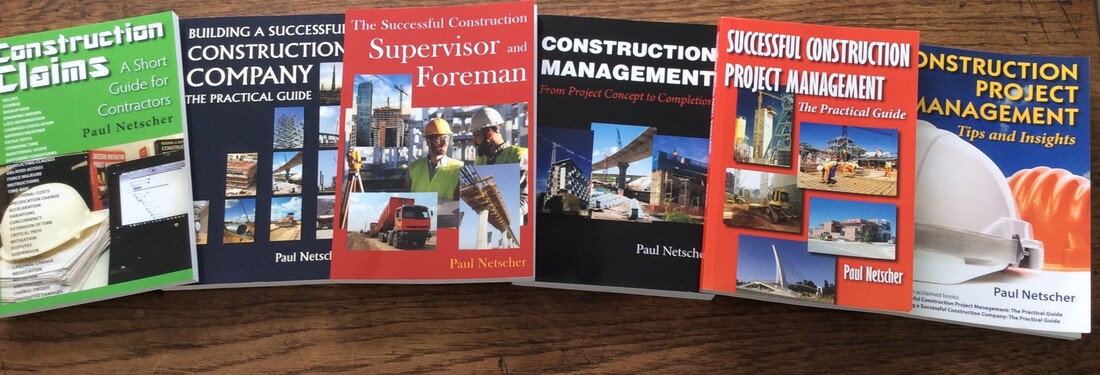Poor communication is often the cause of construction project failuresGood communication is crucial to the success of every construction project. It’s essential for the success of construction project managers and supervisors. It’s something that project managers, supervisors and foremen have to do every day. They must communicate with their team, their managers, company support personnel, suppliers, subcontractors, engineers and architects, the client, testing agents, sometimes the authorities and the public. Regrettably poor communication often leads to project mistakes, misunderstandings, discontent, poor productivity, and even lengthy legal wranglings. The essence of good communicationIt’s essential that communication is civil, clear, concise, effective, takes into account relationships, isn’t condescending, not contradictory, is persuasive and forceful when required, and that it takes into account the level of understanding of the other person. Communication isn’t just about giving and receiving instructions, it’s about keeping the various stakeholders on the construction project informed about changes, progress and problems on the construction project. Communication is often verbal, which includes meetings (both formal and informal), crew briefings, instructions, one on one discussions, and telephone conversations. However, it’s often essential that some communication is in writing so that there’s a record of the instruction, question or decision. In fact it’s vital that items of a contractual nature, items which could have a time or cost implication, items where there could be a misunderstanding, or for events that could later lead to disputes or arguments, are recorded in writing. Regrettably many people have poor memories, especially when an item that’s verbally agreed may cause them problems. It becomes your word against their word. ‘He said, she said’ and who can be believed? So, it’s important that all changes and instructions from the client’s team are in writing, and that all questions which could have a time or cost implication are raised with the client in writing. Sometimes verbal discussions and decisions which may have a time, cost or legal implication, should be later followed up in writing so that there’s a written record. Written communication could be in the form of instructions, meeting minutes, meeting notes, memos, letters and emails. Are you talking to the right person?It’s always essential that communication is addressed through the correct channels, so that the message reaches the right person who is able to take the required action. Communication sent to all, or to whom it may concern, will undoubtedly be ignored by everyone. Understand who should be dealing with the problem and ensure that they’ll receive the email or letter. For instance, when dealing with subcontractors, instructions should be given to managers and not the workers physically doing the work – unless the instruction relates to an immediate safety concern or quality problem. But even quality and safety concerns should be reported to their management – preferably in writing so that there’s a record of the issue in case there’s a repeat of the matter or it’s not fixed. In the same way, it’s important that the client’s team follows the correct channels when dealing with your company. Instructions should never be given directly to your workers unless they relate to an immediate safety or quality concern. It’s essential that your team understands this process. It becomes very confusing, even costly, when your team starts following instructions directly from the client or your management, when you aren’t aware of the instructions. Written communicationUnfortunately many letters, emails and memos are written poorly. They are hard to understand. Most project communication is in English, so even if your first language isn’t English it’s essential that you have a basic understanding of the language and are able to communicate with others properly. Regrettably, even some whose home language is English, who have been schooled in English, fail to understand the rudimentary rules of grammar and spelling. I’ve received many garbled emails and letters, that I couldn’t understand, from people that should have known better. Fortunately, today our computers all have Spellcheck and Grammar-checker, so there should be little excuse for poor spelling and grammar. But, much of it is laziness. It’s essential to read through memos and emails before sending them to ensure that they make sense. Even consider asking someone to check the email before you send it. It could result in problems if your email or letter isn’t understood correctly and the receiver thought you meant something different. Keep letters, emails and instructions simple. Use simple language. Keep sentences short. Avoid using abbreviations, other than those commonly used on the project, then consider explaining the abbreviation at least once. Arrange different thoughts or topics into separate paragraphs. Avoid overuse of exclamation marks (!) and question marks (?). Don’t use capital letters except at the start of sentences and for the names of people and places, and of course when you refer to I. So, don’t use CAPITAL LETTERS like this – it’s rude and unnecessary. Avoid using different colours, or different types of text. Use bold type only for headings. Don’t use emotive language. Write simply, one thought at a time. Then reread and check that it all makes sense and is in a logical order. Will the reader understand what you are saying? If an action is required will the reader know what you’re expecting from them? All letters, emails, instructions and memos should have a date and a heading describing what the letter is about. Check that all your facts are correct. Poorly written letters, memos and emails are often not treated with the seriousness they deserve. Keep a copy of all correspondence you sent in case there’s an argument or issue later. Improving communicationThere are courses which will help you improve both your verbal and written communication skills and these are often well worth the time and cost and will benefit your construction management career, helping you progress up the management ladder. Ensure that your team, your client, the project suppliers and subcontractors all understand what's required from them on the project. Clearly articulate problems and issues that need to be resolved and who should take action. Keep everyone who needs to know informed of what's happening on the project. Direct communication to the right people. Put all important records in writing. Good communication is essential to the success of every construction project. Please like and share this article. Do you want to learn how to manage construction projects and construction companies successfully? Click on picture to view this book on Amazon Click on picture to view this book on Amazon This article is an extract from my book 'The Successful Construction Supervisor and Foreman' which is packed with construction project management tips and advice. I've written several easy to read construction management books for owners, contractors, construction managers, construction supervisors and foremen. They cover all aspects of construction management and are filled with tips and insights. The books are available in paper and ebook from most online stores including Amazon. Need help with your construction project or construction company?Contact me for help and advice.
To read more about the author’s books and find out where you can purchase them visit the pages on this website by clicking the links below:
To read more about the author visit the page 'Paul Netscher' Want to contact Paul Netscher please enter your details on 'Contacts' Find out how Paul Netscher can help you © 2019 This article is not to be reproduced for commercial purposes without written permission from the author. As an Amazon Associate I earn from qualifying purchases construction management construction project management
0 Comments
Leave a Reply. |
Archives
June 2024
Note: We welcome genuine comments, especially comments that add additional information to the subject matter in the article. We however reserve the right to remove inappropriate comments, which includes comments that have nothing to do with the subject, comments that include inappropriate language, and comments that are an advertisement for a product or company, or which include an advertising link. Comments must be in English. We will not enter into discussion on why a particular comment was removed.
CategoriesCopyright 2016 - The attached articles cannot be reproduced for commercial purposes without the consent of the author.
The opinions expressed in the attached articles are those of the writer. It should be noted that projects are varied and different laws and restrictions apply which depend on the location of the contractor and the project. It's important that the reader uses the supplied information taking cognisance of their particular circumstances. The writer assumes no responsibility or liability for any loss of any kind arising from the reader using the information or advice contained herein. "I have what I consider some of the best books on construction management."
Books are available from: Amazon.com Amazon.co.uk takealot.com kalahari.com Amazon.in Amazon.de Amazon.fr Amazon.it Amazon.com.au Powell's Fishpond uread bokus Amazon.ca Amazon.es Other retail stores Available in paperback or on Kindle "28 YEARS OF CONSTRUCTION PROJECT MANAGEMENT EXPERIENCE, DEVELOPING SUCCESSFUL CONSTRUCTION PROJECT MANAGERS AND BUILDING SUCCESSFUL CONSTRUCTION COMPANIES"
|





 RSS Feed
RSS Feed




